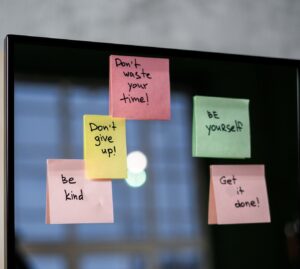15 Ways to Navigate Imposter Syndrome
From self-doubt to standing ovations, learn how to conquer the feeling of being a “musical fraud” and truly own your role as a music educator. You’re not just playing notes, you’re playing a pivotal role in your students’ lives.
Congratulations, you’re a professional! Armed with a degree, student teaching experience and a broad range of skills, you’re well-equipped for your role as a music teacher. However, when you stand before your class or speak with parents, that nagging feeling of being an imposter creeps in.
“What if people discover that I’m a fraud? I can’t even talk to parents without feeling nervous.”
You’re not alone — welcome to the self-doubt club. There’s a seat waiting for you next to my colleagues and me.
Imposter syndrome affects people in many professions, but the spotlight can be especially harsh for music teachers. You’re responsible not only for educating students but also for inspiring a love of music in them, which amplifies the pressure you might feel. Take comfort in knowing that many educators grapple with these same anxieties, even years into their career. Below, you’ll find strategies to help overcome imposter syndrome.

1. Recognize the Syndrome for What it Is
Imposter syndrome is common. You fear being exposed as a “fraud” despite evidence of your competence. Remember, these feelings are an internal struggle about perception, not reality.
If you have self-doubt as you lead your students in their first concert, know that many skilled musicians and teachers have felt the same way. You belong here.
2. Reality Check Your Experience
When doubt creeps in about your qualifications, take a moment to reflect on the foundation of your career. Consider your credentials, hands-on experience and positive feedback you’ve received. Tangible reminders like your degree on the wall or thank-you notes from students and parents can reinforce your competence. As you set up music stands before class, remind yourself of your achievements — your music education degree, years mastering your instrument and successful student-teaching experiences. You’ve earned your position through hard work.

3. Team Up on High-Stakes Projects
If the mere thought of leading a big project like a concert or overnight trip fills you with dread, team up with a more experienced colleague. This collaboration not only eases the workload, but it also assures you that you’re on the right path.
Imagine you’re tasked with organizing the annual spring music festival, and it feels like an impossible task. Don’t be shy about tapping into the wisdom of a seasoned colleague or even a music teacher from another school. Working together provides the opportunity to learn valuable insight from someone with more experience. If you want to earn trust and enhance your reputation, volunteer for high-stakes projects beyond your usual role, like prom planning or travel coordination. And if any mistakes happen, well, that colleague should have known better than to entrust this to an imposter, right? Jokes aside, the real benefit lies in shared responsibility and personal growth.
4. Develop a Character
“I’m not a music teacher, but I play one on T.V.”
When self-doubt arises, employ a performance strategy. In other words, play a character to navigate through tough situations. Visualize the most confident version of yourself and channel that persona when imposter syndrome strikes. If you’re anxious about talking to parents about their student’s progress, imagine how a seasoned educator would handle the situation and emulate that character. This act of “playing the part” can boost your confidence.
For example, when I faced a challenging phone call to a parent, I initially felt like Don, the relatively inexperienced music teacher. However, in that moment, I chose to act as a different version of me — the one who is composed, confident and focused on what’s best for the student.
If assuming a different persona feels disingenuous, remember that we all adapt our behavior in the various roles of our life — work, personal life, parenting and more. And, you’re a musician. Chances are you had to play some sad music when you were happy and vice versa, but ultimately you got the job done.

5. Pep Talks
“I’m good enough, I’m smart enough and doggone it, people like me!” — Stuart Smalley
Boosting your confidence through self-talk or support from others is invaluable. When facing a daunting moment like your first solo performance at a teacher’s conference, take a breather backstage or in a quiet spot. Whisper affirmations: “You’re well-prepared, and you’ve got this.” These words act as your shield against self-doubt.
Additionally, seek support from someone you trust. A quick text or call for a pep talk can make a world of difference. Hearing reassurance from someone else validates your own affirmations.
Verbalizing positive thoughts can transform your mental state, drowning out doubts. Whether it’s that solo performance, a challenging meeting or any situation that triggers imposter syndrome, a timely pep talk can be the boost you need to succeed.
6. Take the Plunge

The best teacher is experience, so don’t overthink and take calculated risks. If you want to tackle a more challenging musical piece, do your research, weigh the pros and cons, then take that leap and put it in the folders for sightreading.
Regardless of the outcome, every risk enriches your professional journey. Lessons from challenges are as valuable as successes. Each challenge builds your experience, chips away at imposter syndrome and informs future decisions. So, when the opportunity arises, seize it, take that calculated risk and grow from whatever comes next.
7. Honesty is the Best Policy
Honesty builds trust, so don’t exaggerate your qualifications. If you’re unsure about something, admit it and promise to follow up with the needed information. This straightforward approach increases trust.
If a student asks about a bassoon fingering that you’re not familiar with, don’t bluff and say, “Mumble, mumble, pancake key.” Be honest and say that you don’t know but commit to researching it. Such forthrightness maintains and often enhances trust.
I once faced an unexpected question during trip planning about medication. I didn’t have an answer, but I assured the parents that I would consult the school nurse and policies, promising a response by the week’s end. It’s OK to not know everything. What matters is your commitment to finding out.
8. Seek Feedback from Trusted Colleagues or Mentors
Before important events or meetings, rehearse your presentation or discuss your plans with an experienced colleague. Seek constructive feedback and, to make the practice more authentic, ask them to pose challenging questions that you might actually face. Offer to return the favor by doing the same for them in the future. This preparation sharpens your material and boosts your confidence for when it really counts.
9. Engage Parents and Students as Partners
Seek input from parents and long-standing community members — their insights are invaluable. A collaborative atmosphere creates opportunities for diverse perspectives and fosters shared responsibility.
Imagine you’re introducing a challenging piece of music with complex rhythms or unfamiliar cultural elements to your percussion class. Instead of avoiding it, say to your class, “This is intricate, and it’s new to me, too. Let’s explore it together.”
Invite students to share how they learn tough rhythms. Transparency about not knowing everything creates a learning environment, turning vulnerabilities into opportunities for communal growth.
What about parents? Many are more than willing to offer help for odd jobs like stuffing envelopes to helping to organize travel. Yes, we’re the musical experts, but don’t shy away from asking parents what they think your program needs. You’ll be surprised at some of their insights.

10. Celebrate Your Achievements No Matter How Small
Remember that complicated rhythm you were initially hesitant to introduce to your percussion section? The one you asked students to help you master? After weeks of collective effort and learning, your students finally nailed it during rehearsal. Don’t gloss over this achievement — celebrate it! Give your students kudos, maybe even bring in a small treat the next day. (I use imaginary points based on our school mascot and tell the kids they are redeemable for nothing, and they still fight over who gets more points!) Don’t forget to give yourself a pat on the back, too.
Acknowledging and celebrating these milestones, however small they may seem, not only boosts your students’ morale, it also helps you construct a more realistic and positive self-image over time. It’s a way to counteract the imposter syndrome by recognizing that, yes, you do have the skills and the right to be in your role.
11. Document Your Successes
After a challenging semester with a new curriculum or innovative teaching method, receiving applause and accolades at the final concert is rewarding. Capture these moments. Take photos, save emails and jot down compliments. Create a digital or physical “feel-good file” and add items to it regularly, including your updated resume, not for job hunting but as a self-affirmation tool.
When imposter syndrome strikes, open that folder. Revisit your accomplishments and positive feedback to ground yourself in your competencies. Acknowledging your capabilities is a powerful antidote to self-doubt. I often look at my feel-good folder; I still have thank you notes from over 15 years ago to remind me of how far I’ve come.
12. Set Realistic Expectations and Goals
Setting achievable goals is crucial, especially for music teachers stepping into successful programs. The weight of expectations, internal and external, can fuel imposter syndrome.
Imagine teaching beginners, dreaming of them mastering a complex piece by year-end. You can achieve this goal by breaking it down. Set attainable milestones like basic scales and rhythms first, then simple ensemble pieces and progress gradually. Celebrate victories at each step because they build confidence.
Reality Check: It’s natural to want to emulate successful programs or directors. Keep in mind that they didn’t achieve their status overnight. It’s easy to set our sights on the cosmos — making it to district festivals, then state, national and maybe even international competitions. But such a fast track to the stars can set you up for failure, or at the very least, unnecessary stress. Start with engaging and enjoyable concerts as a foundation. Set challenging yet realistic objectives. Don’t reinforce imposter syndrome with unrealistic expectations. Build your legacy — not someone else’s — step by step.

13. Establish a Support Network
Feeling isolated intensifies self-doubt. Build a network of colleagues, mentors and online teacher forums for support and growth. Chances are, some go-getter has already created a Facebook group for your discipline and grade. They offer advice, fresh perspectives and a safe space for questions and insecurities.
If you know about a veteran music teacher in your district, reach out. Invite them for a coffee or virtual chat. Be open about your triumphs and challenges. Seasoned teachers often faced similar uncertainties and fears, offering both practical advice and emotional reassurance. You’re not alone.
14. Mindfulness and Self-Compassion
Mindfulness combats imposter syndrome, so be aware of negative thoughts and emotions. Show self-compassion as you would to a friend.
If you’re preparing for a high-stakes event, pause, practice deep breathing or mindfulness exercises. Catch negative self-doubt in its early stages. Ask yourself, “What advice would you give a colleague or student?” It’s likely not harsh, but it is reassuring. Extend that same courtesy to yourself.
15. Share Your Experience
Once you’ve had a successful semester or school year in dealing with imposter syndrome, offer guidance to others facing similar challenges. Whether they are student teachers, recent graduates, or new department members, share your wisdom through regular meetings. This not only benefits them but also boosts your self-confidence and skills as you share your journey and effective strategies.

You Can Do It!
Battling imposter syndrome is a long-term endeavor, not a one-time fix. Whether you’re a seasoned music teacher or new to the field, it’s natural to feel self-doubt at times. The key is to break down your journey into manageable goals and celebrate your victories along the way. Keeping a “feel-good folder” can serve as a powerful antidote during moments of doubt, as can the practice of mindfulness.
So next time you find yourself questioning your right to stand in front of your music class or nervously preparing for a parent-teacher meeting, pause and remind yourself that you’ve earned your place. In those moments of doubt, remember to be both your toughest critic and your biggest supporter. You are more capable than you think, and each day offers a new opportunity to prove that — not just to others, but to yourself.















